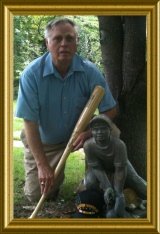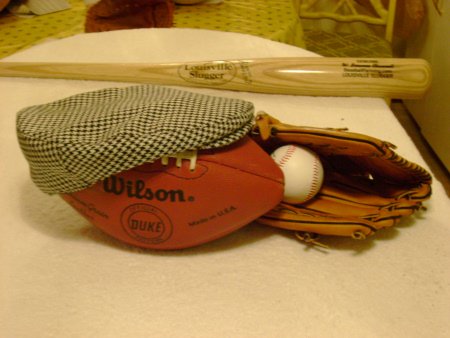Sandlot-Baseball
Local Teams Anywhere USA
We Challenged, We Played, We Were Winners!

Sandlot-Baseball playing in the neighborhood and against your neighbors of adjoining communities is where baseball found its life by the formation and playing of games of baseball against your neighboring community. It was spirited with the need to win and be winners being as natural as rain.
Bragging rights were at stake and losing was not a good option.
The word sandlot refers to the makeshift or make do playing field, which could be nothing more than an empty piece of land in the area composed of grass, dirt, or sand that is big enough to accomodate playing of the game.
The baseball games that get underway generally follows the basic baseball rules of baseball. More specific rules can be set for games and may vary each time the game is played. These rules are usually agreed upon before the game begins by teams of young players usually from the same neighborhood.
|
Must See Video Tour |
The most amazing thing is that we had no schedules. We had no umpires to pay. We never knew we would have enough show up to have a full team. I'll tell you it happened, time and time again, all summer long.
We played the game by using basic baseball rules as we were taught by our older brothers and sandlot baseball players. Did we have an official baseball rules book? No way, we knew the rules as they were taught to us.
Basic baseball rules is not rocket science study. Three strikes and you are out,tagged between bases you are out, fielder catches the fly ball you are out, three outs and the other team bats.
That is the simple baseball rules or basic rules of baseball as we knew and played by, as we grew older more of the official baeball rules were enforced and we played with more knowledge, and became cracker jack players.
The designated ball field was always there and waiting for those sandlot-baseball teams to show up with their ragtag gloves and bats which had some repairs. By luck, we somehow always managed to come up with a couple of old scuffed up balls.
Today it seems like that era was only a figment of our imagination, that we did in fact play game after game, helter skelter, one community against the other.
Trussville was the largest of the communities involved in this makeshift "put together" competition of sandlot baseball teams.
I said the largest community not the best. The most productive of dedicated teams for the competition would not allow the luxury of dominance playing centered on any specific group.
Some of the surrounding community areas could be depended upon to turn out a full "ready to romp" team at the drop of a hat.
Roebuck Plaza and the group that went to grammar school at Piney Grove was always ready to play. A ringer or two from the Huffman and Cozy Corner area religiously claimed to be Roebuck Plaza stalwarts.
The Chalkville and Clay communities would do battle as soon as they knew that competition was game enough to give them a challenge.
Happy Hollow and Roper Hill seemed to naturally form a sandlot baseball team from between these two areas. Remember sandlot baseball playing did not stand on ceremony. It happened by boys loving the game of sandlot-baseball.
Argo just never seemed to muster enough ball players to form a complete team but believe me, baseball did not gain the fame as Americas National Pastime by ever excluding a baseball player showing up ready to play.
This adoption process in baseball should be the model for the entire world. Sandlot-Baseball, school ground recess, and pickup baseball games always made room for one more player to get a "its my turn" at bat.
Pity that poor soul, past teenage years, standing near the ball diamond where enough had gathered to get a game under way. The drafting of a bystander on the spot, as an umpire, was standard fare.
Right of refusal to act as the umpire was the same as a kiss of death from every kid on the field. Just like a herd of elephants, they would never forget and come Halloween time, it would be pay back time.
Some times scattering of communities was cause for concern. Would the team that promised to be there on the appointed Saturday or Sunday actually show?
Ingenuity amongst young energetic baseball players should be ample reason to know yes, by golly, they would be there. Walk, hitch hike, ride bicycles, conjole some dad or a neighbor with a car to drop them off at the site, it mattered not. The committment was made and the promise was kept.
Names may come and go but the rememberance of faces will linger on forever.
The Goodwins,Wears,Burns brothers,Wells,Wrights,Wages,Leslie,Grissom boys,Cowan brothers, Gilmers,Wahoo Needham,Self boys,Martins,Fulmer, McEvoys,Hales, Seals, Taylors, Dunaway brothers,Weems,Day,Bryan,Strickland,Tidwells,Longs,Mobley, Treadways,Deshazo,Porter,Miller,Massey's,Morgan, Wilson,Keith,Nichols,Connell,Gwin,Studeman,Channell, Britnells,Quicks,Smiths,Jones.
Build The Field Of Dreams They Will Come.
--------HERE IT IS---------ABSOLUTELY GREAT DATA FOR COACHES AND COMMUNITIES TO PROVIDE PERFECT BALL DIAMONDS, WITH THE CORRECT DIMENSIONS, FOR YOUNGSTERS TO ENJOY BASEBALL!
The Ultimate Baseball Field Renovation Guide offers step-by-step actions, tips, checklists, and more. We have exactly the field tips, guide, & resources you need to make your field the best.
All community sandlot-baseball diamonds need a little facelift.
Throughout history we have faced the Mystery Of The Ages. Some things just seem to have no earthly answer. It becomes a matter of faith and belief.
The War Between the States, Civil War, if you will, or the War of Rebellion, the War of Secession or the War for Southern Independence and States Rights was a terrible time in our history. It happened and its true real cause will never be agreed upon.
The same can be said for some community baseball teams and their exact driving force or cause for joining together to do competitive sporting conflict, one against the other.
It has to be a genealogical phenomenon. Boys and girls saw their dads, uncles or cousins play the game so they just naturally were drawn into this baseball playing game with the thought of competition and winning.
Growing up, it was natural for my "want to" to be tweaked because my older brothers set the standard to follow by playing the game. Baseball playing and the history of wars and the why question are symbolic, one to the other.
Why would one warring faction take up arms against another and end up in an epic struggle of war? Same for ball players. Why could they not be perfectly satisfied catching the ball, throwing the ball and batting the ball?
Why the competitive factor of seeing who could win enter the equation? Did I say it must be genealogical? Did the Israelites struggle against the Philistines? Does not the Power of Satan fiercely do battle with the Christian Faith?
Did not the Southerner choose to go to battle rather than have some faction such as the Union of the United States to deprive them of their free rights of trade for freedoms they chose in their own right?
To the many teammates playing along side me in our many ball games the prime object was to best our sandlot baseball neighbor, in a friendly contest of a sandlot-baseball game, and to claim the victory as the winner.
Sandlot-baseball teams were the very essence of how life's struggles unfold. Blood letting or the taking of a life was not the goal but the thrill of victory and proclaimed to be the winner was it all.
Sportsmanship and conducting one's self as a gentleman in a victory or a loss is what permeates Champions and All-Stars and separates our baseball hall of fame players as honored heroes from the also rans.
The days playing baseball with my teammates and classmates, my friends, in friendly contests around the sandlot-baseball diamonds were more than a thrill. It was a lesson in life.
It was "bat and ball" and not "cannon and sword." out on the sandlot-baseball diamonds.
Long live sandlot-baseball and little league the grit and fiber of this great game of baseball and now led by Little League Baseball.
 "Now You Have Knocked The Hide Nearly Off Of Me Making Like Baseball Was Little League But Now You Have The Boys From The Sandlots Forming Up And Ganging Up On Me With The Industrial Leagues And They Whack And Knock The Stuffing Out Of Me."
"Now You Have Knocked The Hide Nearly Off Of Me Making Like Baseball Was Little League But Now You Have The Boys From The Sandlots Forming Up And Ganging Up On Me With The Industrial Leagues And They Whack And Knock The Stuffing Out Of Me."
"Cruel And Unfair Punishment Rule Needs To Be Applied For Saving Of Little White Baseballs Sake. Maybe We Should Have A Reserve Clause Or Maybe A Union To Save Our Hides?"
One step up the ladder in our Sandlot-Baseball world was the formation and growing of our Industrial Baseball Leagues and Birmingham,Alabama was the hotbed or epic center of such when cottontop was growing up.
I have taken the liberty of using a portion of The Encyclopedia of Alabama to provide this article on the Industrial Baseball Leagues in Alabama.
After all the Encyclopedia of Alabama has invited us all to share this:
Industrial Baseball Leagues in Alabama
Industrial league baseball was a form of semi-professional baseball that developed during the late nineteenth century and became commonplace in Alabama during much of the twentieth century. Companies sponsored the leagues to enhance employee loyalty and provide entertainment for their workers and families, forming teams made up of players from their own payrolls supplemented by some professionals.
Bessemer Industrial League Baseball Team In Alabama, the trend developed along two lines—industrial leagues in urban areas and company teams (coal mines, cotton mills, and so on) in more isolated rural areas—with both limiting their competition to teams that were geographically close. The strongest industrial league in Alabama was the Birmingham Industrial League, composed of companies working mostly in Birmingham's iron and steel industry. Reflecting the segregated society of the day, many companies financed separate white and black teams to reach out to both segments of the community. The powerhouse of all the industrial teams in Birmingham was American Cast Iron Pipe Company (ACIPCO). ACIPCO's biggest rival was the Stockham Valves and Fittings company, which it often battled for the annual Industrial League championship. Games between the two teams would sometimes draw 8,000 to 12,000 spectators. The Clow Pipe Company also fielded talented teams, as did Connor Steel, L&N Railroad, Perfection Mattress (whose team later became the 24th Street Red Sox), Sloss Furnace, and Pullman Stanley. Both Willie Mays and his father played in the same outfield during one season with the Fairfield Stars.
Eight to ten teams typically competed during any specific season, but the total number of different teams from the 1920s through the 1940s exceeded three dozen. Teams would typically play in two divisions (Red and Blue) with an official season of 20-to-25 games. The two division leaders would meet in an end-of-the-season championship game. Sloss FieldMajor teams would also play up to 60 games against non-league opponents each year. Most games in the Birmingham area were played at Sloss Field, but ACIPCO and Stockham Valve both had fields for their home games. Another field was located in the Titusville area of Birmingham.
During World War II, when most of baseball's minor leagues shut down, Mobile also established an industrial league with two divisions. The Industrial Division included teams from the Alcoa aluminum factory, Alabama Ship Yard, and Gulf Ship Yard. The Service Division fielded military teams from Brookley Air Base, Barin Field, and the U.S. Coast Guard.
These leagues and teams provided both entertainment and employment opportunities. Factory workers and miners worked hard all week and then faced limited entertainment options on the weekends. Local teams played two or three games a week, with each game becoming a major social event. Holidays were particularly festive; on Labor Day and the Fourth of July, for example, companies might sponsor a cookout before the games. Industrial leagues also provided lucrative employment opportunities for young athletes, who were hired by the company to do odd jobs during the week and essentially paid to play baseball on the weekends. Many players earned good incomes by the standards of the day. If they stayed with the company, rather than joining a professional team, they often had a job for life.
Other players used the industrial league as a stepping stone to minor league baseball, and from there to the major leagues. One reason that so many major-league ballplayers came out of the South and out of Alabama during the first half of the twentieth century was that these leagues enabled teenagers to play with grown men and against good teams, a perfect recipe for developing young talent.
Because some industrial league players were former professionals who had returned to the security of a job near their homes, the level of competition sometimes rivaled that of the major leagues. Some teams might have two, three, or more ex-major league players on their squad. Further, former pro players often took jobs managing the local teams. Whereas playing for such a team would be viewed as a demotion for modern players, that stigma did not exist before 1950; companies often paid higher salaries than many players could make in the major leagues.
Most industrial league players were recruited from the sand lots and street teams of poor areas in Birmingham and surrounding areas. Scouts for the local teams would visit local youth games, looking to sign a talented teenager for their company. The industrial teams, in turn, provided a feeder system to the major leagues for white players and to the Negro Leagues for African Americans. For African Americans, in particular, the industrial leagues were considered the Negro minor leagues. Negro Leaguer Elmer Knox, a native of Anniston who became a member of the Atlanta Black Crackers, got his start in the steel industry. Knox reportedly said that the steel industry was responsible for developing more players that any other industry in the country. In Alabama, those included Negro League notables Lorenzo "Piper" Davis and the five Bankhead brothers. Dan Bankhead eventually made the major leagues in 1947, becoming the second African American player with the Brooklyn Dodgers. His roommate was Hall of Famer Jackie Robinson.
Some critics cited industrial-league and company-sponsored baseball as examples of corporate paternalism in which companies used the sport as a way to manage their workers' behavior and manipulate their attitudes toward work. Some also labeled it as a modern form of slavery or a form of welfare capitalism, arguing that the companies financed the teams rather than paying higher wages to workers with little education. Others disagreed, arguing that the teams had a positive impact by increasing employee identification with that company and providing entertainment for the workers and their families. The large crowds that attended the games, which were often larger than those of the minor league Birmingham Barons, demonstrated their popularity.
During its existence, industrial baseball was an integral part of many Alabama communities, leading many companies to develop teams that rivaled professional teams in terms of both talent and salaries, and the players became heroes to the other workers in the company. The popularity of the industrial leagues waned as the integration of the major leagues led to a decline in both talent and local interest, and national broadcasts of major league games offered a higher profile alternative for fans. Some remnants of the industrial leagues remain in the form of city recreational teams, although many shifted to playing softball. Report any broken links to Baseballfarming would be a big help please Contact Us.
Batter Up----Let's Play Ball....
Have you ever had the "want to" to have your own Web Site? SBI! without question is the best web hosting partner you could possibly have.
If you ever wanted to take advantage of a real deal then look right here:"SBI! is now available for $29.99 per month."
Folks I have some Partners even Sandlot-Baseball partners in presenting my Baseballfarming website for your enjoyment.
I am proud to be associated with the people at SiteSell and so will you. Click on the Powered By: SBI! button at the bottom of this page and introduce yourself.
Go Shopping Save Money Baseball Equipment And More----
Baseball has heroes.

